语法专题-英语
英语语法专题-----句子成分和基本句型

The reason is that I stayed up
last night.
句子
I like I like swimming
宾语
是动作的承受者。及物动词及相当于及物动词 的短语后都必须带宾语。
I like apples. 名词 He gave me a book.
代词 名短
He likes to play basketball 不定式
I have a friend in America. 地点介短 I liked reading story books when I
was a child. 句子 2. Jane is going home from school. 3. The man is wearing a black jacket. 4. The text is very difficult. 5. I saw him reading in the sun. 6. She put the dishes on the table.
The weather gets cold. Kunming becomes beautiful.
2. 主语 + 谓语 (vi.)
He arrived. He arrived yesterday. He came back.
3. 主语 + 谓语(vt./vi+介词) + 宾语
I like apples. She often listens to music . He arrived at Kunming yesterday
名词或短语
名词,代词,数词可以作做主语。动名词,动 词不定式,句子也可以做主语,句子做主语叫 主语从句
Monkey eats bananas. It is my book. One and (plus) one is two. Hard working leads to success. To finish homework is a must to student. What makes the teacher angry is that he is talking in class again.
英语语法大全(精心整理)
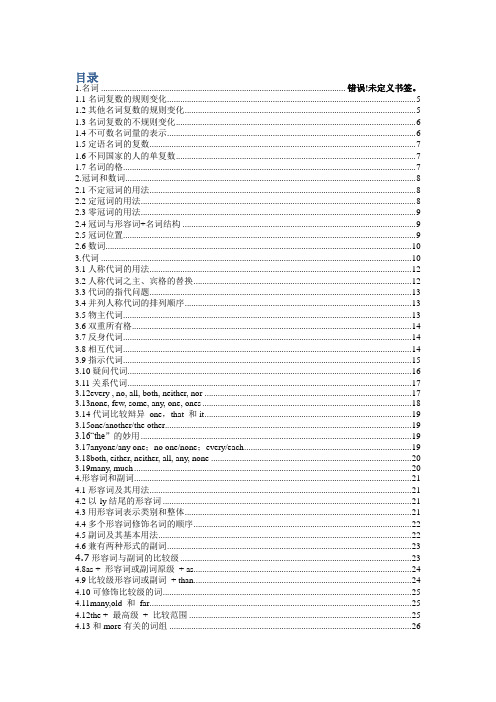
目录1.名词 ............................................................................................................... 错误!未定义书签。
1.1名词复数的规则变化 (5)1.2其他名词复数的规则变化 (5)1.3名词复数的不规则变化 (6)1.4不可数名词量的表示 (6)1.5定语名词的复数 (7)1.6不同国家的人的单复数 (7)1.7名词的格 (7)2.冠词和数词 (8)2.1不定冠词的用法 (8)2.2定冠词的用法 (8)2.3零冠词的用法 (9)2.4冠词与形容词+名词结构 (9)2.5冠词位置 (9)2.6数词 (10)3.代词 (10)3.1人称代词的用法 (12)3.2人称代词之主、宾格的替换 (12)3.3代词的指代问题 (13)3.4并列人称代词的排列顺序 (13)3.5物主代词 (13)3.6双重所有格 (14)3.7反身代词 (14)3.8相互代词 (14)3.9指示代词 (15)3.10疑问代词 (16)3.11关系代词 (17)3.12every , no, all, both, neither, nor (17)3.13none, few, some, any, one, ones (18)3.14代词比较辩异one,that 和it (19)3.15one/another/the other (19)3.16“the”的妙用 (19)3.17anyone/any one;no one/none;every/each (19)3.18both, either, neither, all, any, none (20)3.19many, much (20)4.形容词和副词 (21)4.1形容词及其用法 (21)4.2以-ly结尾的形容词 (21)4.3用形容词表示类别和整体 (21)4.4多个形容词修饰名词的顺序 (22)4.5副词及其基本用法 (22)4.6兼有两种形式的副词 (23)4.7形容词与副词的比较级 (23)4.8as + 形容词或副词原级+ as (24)4.9比较级形容词或副词+ than (24)4.10可修饰比较级的词 (25)4.11many,old 和far (25)4.12the + 最高级+ 比较范围 (25)4.13和more有关的词组 (26)5.1系动词 (27)5.2什么是助动词 (28)5.3助动词be的用法 (28)5.4助动词have的用法 (29)5.6助动词shall和will的用法 (30)5.7助动词should和would的用法 (30)5.8短语动词 (30)6.动名词 (31)6.1动名词作主语、宾语和表语 (31)7动词不定式 (32)7.1不定式作宾语 (32)7.2不定式作补语 (32)7.3不定式主语 (33)7.4It's for sb.和It's of sb. (34)7.5不定式作表语 (34)7.6不定式作定语 (34)7.7不定式作状语 (34)7.8用作介词的to (34)7.9省to 的动词不定式 (35)7.10动词不定式的否定式 (35)7.11不定式的特殊句型too...to (36)7.13不定式的特殊句型Why not (36)8.特殊词精讲 (37)8.1stop doing/to do (37)8.2forget doing/to do (37)8.3remember doing/to do (37)8.4regret doing/to do (37)8.6try doing/to do (38)8.7go on doing/to do (38)8.8be afraid doing/to do (38)8.9be interested doing/to do (38)8.10mean to doing/to do (39)8.11begin (start)doing/to do (39)8.12感官动词+ doing/to do (39)9.分词 (39)9.1分词作定语 (39)9.4分词作补语 (41)9.5分词作表语 (41)9.6分词作插入语 (41)9.7分词的时态 (41)10.独立主格 (42)10.1独立主格 (42)10.2With的复合结构 (42)11.动词的时态 (43)11.1一般现在时的用法 (43)11.3used to / be used to (44)11.4一般将来时 (44)11.5be going to / will (45)11.6be to和be going to (45)11.7一般现在时表将来 (45)11.8用现在进行时表示将来 (45)11.11用于现在完成时的句型 (46)11.12比较since和for (47)11.14延续动词与瞬间动词 (47)11.17将来完成时 (48)11.26一般现在时代替进行时 (50)11.27现在进行时代替将来时 (51)11.28时态一致 (51)1.29时态与时间状语 (51)12.动词的语态 (51)12.1Let的用法 (51)12.2短语动词的被动语态 (52)12.3表示"据说"或"相信" 的词组 (52)13.句子的种类 (53)13.1句子的种类 (54)13.4用助动词进行强调 (56)14.倒装 (58)14.1倒装句之全部倒装 (58)14.2倒装句之部分倒装 (58)14.4so, neither, nor作部分倒装 (59)14.5only在句首要倒装的情况 (59)14.6as, though 引导的倒装句 (59)14.7其他部分倒装 (60)15.主谓一致 (60)15.1并列结构作主语谓语用复数 (60)15.6与后接名词或代词保持一致 (61)16.虚拟语气 (61)16.1真是条件句 (62)16.2非真实条件句 (62)16.4虚拟条件句的倒装 (63)16.7比较if only与only if (64)16.8It is (high) time that (64)17.名词性从句 (64)17.1引导名词性从句的连接词 (65)17.2名词性that-从句 (65)17.3名词性wh-从句 (66)18.定语从句 (67)18.1关系代词引导的定语从句 (67)18.2关系副词引导的定语从句 (68)18.9关系代词that 的用法 (70)19.状语从句 (70)19.1地点状语从句 (70)19.2方式状语从句 (70)19.3原因状语从句 (71)19.4目的状语从句 (71)19.5结果状语从句 (71)19.6条件状语从句 (72)19.7让步状语从句 (72)19.8比较while, when, as (73)19.9比较until和till (73)19.10表示"一...就..."的结构 . (73)20.1并列连词与并列结构 (74)20.2比较and和or (74)20.3表示选择的并列结构 (75)20.4表示转折或对比 (75)20.5表原因关系 (75)20.6比较so和such (76)21.情态动词 (76)21.1情态动词的语法特征 (76)21.3比较may和might (76)21.4比较have to和must (77)21.5must表示推测 (77)21.6表示推测的用法 (77)21.7情态动词+ have +过去分词 (78)21.8should 和ought to (78)21.9had better表示"最好" (78)21.10would rather表示"宁愿" (79)21.14比较need和dare (80)22介词 (80)22.1介词的句法功能 (80)22.2主要介词区别 (80)1.名词名词可以分为专有名词(Proper Nouns)和普通名词(Common Nouns),专有名词是某个(些)人,地方,机构等专有的名称,如Beijing,China等。
中考英语语法专题复习(含答案)

中考英语语法专题复习(含答案)一、单项选择题1. — __________ you ever ________ to Australia?— Yes, I have been there twice.A. Do; goB. Have; goneC. Did; goD. Will; go- 答案:B2. — Could you please tell me ________ ?— Sure. The library is just around the corner.A. how can I get to the libraryB. how I can get to the libraryC. how get to the library I canD. how can get I to the library- 答案:B3. My father is a doctor. He ________ from Shanghai University of Traditional Chinese Medicine in 1998.A. graduatedB. have graduatedC. was graduatingD. has been graduated- 答案:A二、完成对话根据对话内容,从方框中选项中选出能填入空白处的最佳选项,选项中有两项为多余选项。
A: Hi, Linda. I heard you went to the theater last night. How wasthe play?B: Oh, it was fantastic! The actors were really talented and the story was captivating.A: That sounds great. What was the play about?B: It was a love story set in 19th-century England. The main characters were a wealthy young woman and a poor but passionate writer.A: That sounds interesting. __________B: Of course. The ending was quite unexpected. The heroine chose love over money and followed her heart in the end.A: That's a beautiful message. __________B: Absolutely. It made me really appreciate the power of love and the importance of staying true to oneself.A: I should definitely go see it then. Thanks for sharing your experience, Linda!选项:A. Did you enjoy the music?B. Was the acting good?C. Did the play have a happy ending?D. Who was the main actress?E. Were there any interesting twists in the plot?- 答案:C E三、改错题请找出下列各句中的语法错误并改正。
英语语法基础知识大全初中
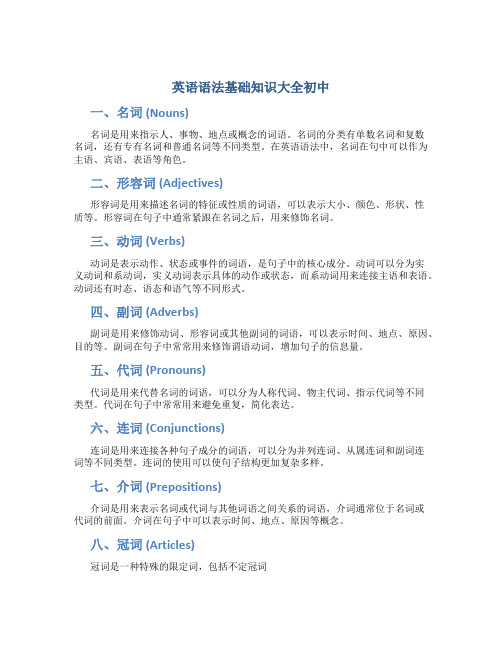
英语语法基础知识大全初中
一、名词 (Nouns)
名词是用来指示人、事物、地点或概念的词语。
名词的分类有单数名词和复数
名词,还有专有名词和普通名词等不同类型。
在英语语法中,名词在句中可以作为主语、宾语、表语等角色。
二、形容词 (Adjectives)
形容词是用来描述名词的特征或性质的词语,可以表示大小、颜色、形状、性
质等。
形容词在句子中通常紧跟在名词之后,用来修饰名词。
三、动词 (Verbs)
动词是表示动作、状态或事件的词语,是句子中的核心成分。
动词可以分为实
义动词和系动词,实义动词表示具体的动作或状态,而系动词用来连接主语和表语。
动词还有时态、语态和语气等不同形式。
四、副词 (Adverbs)
副词是用来修饰动词、形容词或其他副词的词语,可以表示时间、地点、原因、目的等。
副词在句子中常常用来修饰谓语动词,增加句子的信息量。
五、代词 (Pronouns)
代词是用来代替名词的词语,可以分为人称代词、物主代词、指示代词等不同
类型。
代词在句子中常常用来避免重复,简化表达。
六、连词 (Conjunctions)
连词是用来连接各种句子成分的词语,可以分为并列连词、从属连词和副词连
词等不同类型。
连词的使用可以使句子结构更加复杂多样。
七、介词 (Prepositions)
介词是用来表示名词或代词与其他词语之间关系的词语,介词通常位于名词或
代词的前面。
介词在句子中可以表示时间、地点、原因等概念。
八、冠词 (Articles)
冠词是一种特殊的限定词,包括不定冠词。
高考总复习 英语语法专题1

⑪ —How long ________ in Hong Kong? —For just the weekend.I'll be back next Monday
morning.
A.have you stayed C.did you stay B.are you staying D.do you stay
必修一
英语
高考总复习人教版
(5)be间或用于进行时态,表示一时的表现。 He is just being polite.他只是要表现自己有礼貌。(有
讥讽之意)
(6)以下动词通常不用于进行时态: love,like,hate,hope,wish,want,prefer,know, understand , remember , agree , believe , recognize , guess,suppose,mean,hear,see,seem,find,mind, have(有)等。
A.write
C.have written
B.will write
D.are writing
解析:next time作连词,引导时间状语从句往往用一 般现在时。 答案:A
必修一
英语
高考总复习人教版
2.现在进行时 (1)表示现在正在进行的动作。
这样考过
⑨If a computer crashes,you will lose the file you ________ on unless you save it regularly. A.are working C.will work B.work D.worked
The train leaves at 815.火车在815开。(强调时刻 安排)
英语名词语法专题

a poem(一首诗 ) a machine(一台机器 ) a job(一件工作 ) a laugh(一个笑声 ) a permit(许可证 ) a garment (一件衣裳 ) a bag(case) (一件行李 ) a loaf (一只面包 ) a hair(一根头发 )
2021/5/27
poetry(诗歌总称 ) machinery(机器总称 ) work(工作 ) laughter(笑声 ) permission(允许 ) clothing(衣裳总称 ) luggage, baggage(行李 ) bread(面包 ) hair( 头发)
a youth (年青人 )
power ( 力量 )
a power ( 大国 )
beauty ( 美 )
a beauty ( 美人,美的东西 )
pleasure( 愉快 ) 2021/5/27
relation(关系)
a pleasure( 使人感到愉快的事 )
19
a relation(亲戚)
英语中有许多对词,一个可数,一个不可数。
2021/5/27
9
3. Material Nouns: 指无法分为个体的物质。
Eg: beer; cake; cloth; cotton; detergent; fur; ice; paint; paper; soil
一般来说,物质名词是不可数的,因而没有复数形式。但有一些 特殊情况:
1) 有些物质名词可用作可数名词,表示“一份”、“一杯”、
Eg: Diana; Beijing; Americans;English; May; New Year’s Day
注意:专有名词的第一个字母要大写
2021/5/27
初中英语语法讲解-15个专题汇总(习题和答案)word版
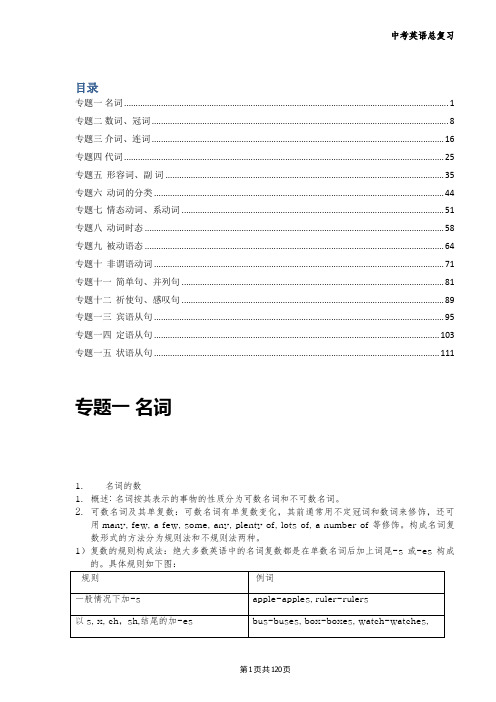
目录专题一名词 (1)专题二数词、冠词 (8)专题三介词、连词 (16)专题四代词 (25)专题五形容词、副词 (35)专题六动词的分类 (44)专题七情态动词、系动词 (51)专题八动词时态 (58)专题九被动语态 (64)专题十非谓语动词 (71)专题十一简单句、并列句 (81)专题十二祈使句、感叹句 (89)专题一三宾语从句 (95)专题一四定语从句 (103)专题一五状语从句 (111)专题一名词1.名词的数1.概述: 名词按其表示的事物的性质分为可数名词和不可数名词。
2.可数名词及其单复数:可数名词有单复数变化,其前通常用不定冠词和数词来修饰,还可用many, few, a few, some, any, plenty of, lots of, a number of 等修饰。
构成名词复数形式的方法分为规则法和不规则法两种。
1)复数的规则构成法:绝大多数英语中的名词复数都是在单数名词后加上词尾-s或-es构成的。
具体规则如下图:a.单复同形的:Chinese-Chinese, Japanese-Japanese, deer-deer, sheep-sheep, fish-fish(表示鱼的数量)b. 熟记下列词的复数变化:man-men, woman-women, policeman-policemen, foot-feet, tooth-teeth, mouse-mice, child-childrenc. 以man, woman做定语构成的复合名词,变复数时要全变:a man teacher-two men teachers; 其他情况一般只变主体名词而作定语的名词不变:a girl student-two girl students3. 不可数名词:不可数名词没有单复数。
如:water, meat, air等。
在表示数量时,通常用以下方法。
1)用some, much, a little, little, a lot of, lots of, plenty of 等表示多少。
人教版九年级英语语法专题训练(Word版含答案)
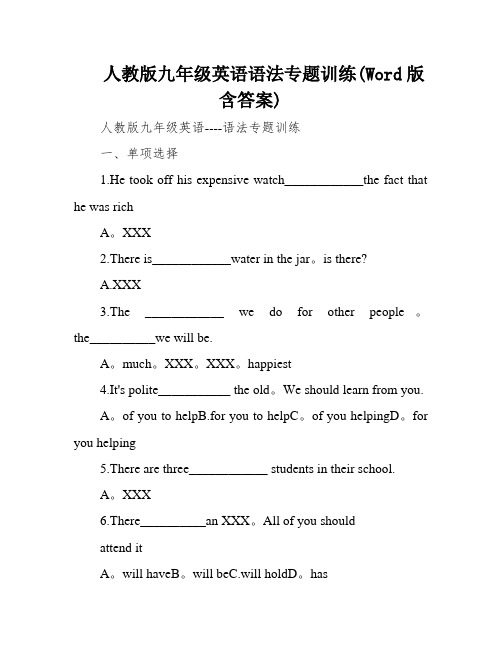
人教版九年级英语语法专题训练(Word版含答案)人教版九年级英语----语法专题训练一、单项选择1.He took off his expensive watch____________the fact that he was richA。
XXX2.There is____________water in the jar。
is there?A.XXX3.The ____________ we do for other people。
the__________we will be.A。
much。
XXX。
XXX。
happiest4.It's polite___________ the old。
We should learn from you.A。
of you to helpB.for you to helpC。
of you helpingD。
for you helping5.There are three____________ students in their school.A。
XXX6.There__________an XXX。
All of you shouldattend itA。
will haveB。
will beC.will holdD。
has7.____________will you come back from you work。
Dad?In about half an hour。
dear.A。
XXX8.The government is setting up nature parks___________ protect pandas.A。
XXX9.We had fun___________ the robots do many different kinds of things.A。
XXX10.-Does the old man have to____________his wife?Yes。
英语词汇语法专题练习
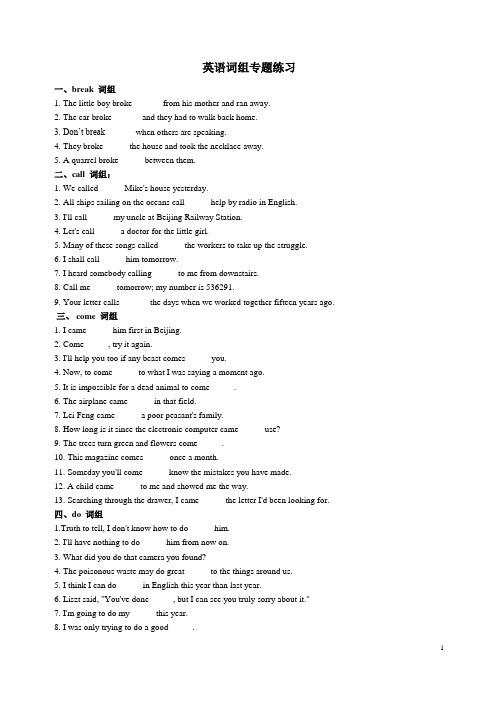
英语词组专题练习一、break 词组1. The little boy broke ______ from his mother and ran away.2. The car broke ______ and they had to walk back home.3. Don’t break ______ when others are speaking.4. They broke _____ the house and took the necklace away.5. A quarrel broke _____ between them.二、call 词组:1. We called _____ Mike's house yesterday.2. All ships sailing on the oceans call _____ help by radio in English.3. I'll call _____ my uncle at Beijing Railway Station.4. Let's call _____ a doctor for the little girl.5. Many of these songs called _____ the workers to take up the struggle.6. I shall call _____ him tomorrow.7. I heard somebody calling _____ to me from downstairs.8. Call me _____ tomorrow; my number is 536291.9. Your letter calls _____ the days when we worked together fifteen years ago.三、 come 词组1. I came _____ him first in Beijing.2. Come _____, try it again.3. I'll help you too if any beast comes _____ you.4. Now, to come _____ to what I was saying a moment ago.5. It is impossible for a dead animal to come _____.6. The airplane came _____ in that field.7. Lei Feng came _____ a poor peasant's family.8. How long is it since the electronic computer came _____ use?9. The trees turn green and flowers come _____.10. This magazine comes _____ once a month.11. Someday you'll come _____ know the mistakes you have made.12. A child came _____ to me and showed me the way.13. Searching through the drawer, I came _____ the letter I'd been looking for.四、do 词组1.Truth to tell, I don't know how to do _____ him.2. I'll have nothing to do _____ him from now on.3. What did you do that camera you found?4. The poisonous waste may do great _____ to the things around us.5. I think I can do _____ in English this year than last year.6. Liszt said, "You've done _____, but I can see you truly sorry about it."7. I'm going to do my _____ this year.8. I was only trying to do a good _____.五、 get 词组1. How are you getting _____ _____ your English?2. He got the book _____ from her.3. The bank robbers used a stolen car to get _____.4. When did you get _____ from the countryside?5. Have you got _____ the book you lent him?6. "Get _____ on your knees," said the Genie, "for I am going to kill you."7. The dust has got _____ my eye.8. This mistake may get him _____ difficulties.9. Before I could get _____ a word he had measured me, and was giving orders for evening suits, ...10. If you knocks into someone, or get _____ his way, you says, "Excuse me." or "I'm sorry."11. When you are in London, you might get _____ _____ _____ a friend of mine.12. The conductor got _____ and checked the rails.13. She got _____ her bicycle and cycled off.14. You work too hard! You should get _____ a bit more.15. If you don't want to go, I suppose I can get _____ _____ the ticket.16. We all try to get _____ at least once a year at Christmas time.17. It took us only four minutes to get _____ the Customs(海关).六、give 词组1. In those days, he used to give _____ a part of his income to help his friend.2. Both sides argued with reason, and neither would give _____.3. If they are burned, they give _____ poisonous gases.4. When they made ready to climb the next ridge(山脊),they found that their oxygen had given ______.5. Both the man and horse gave _____ after the long ride.6. All hope of finding the missing aircraft was given _____ and the search stopped.7. Mary had to give _____ her job after her marriage.8. 举行音乐会9. 演讲,做报告10. 给...上课11. 给某人关于... 的忠告七、 go 词组1. Please don't go _____ _____ it till you've seen me again.2. He has been in this class only a few weeks and he is already going _____.3. Many years have gone _____ since we first met.4. The parade (游行)went _____ us.5. The crocodile went _____ under the water.6. Let's go _____ by the lift (elevator).7. The war went _____ until 1918.8. If you never read the newspapers, you'll never know what's going ______ in the world.9. After he had given an account (说明)of the difficulties he went _____ to suggest ways of overcoming them.10. They went _____ _____ their open-air performance in spite of the rain.11. Put more wood on the fire, otherwise it will go _____.12. The mechanic(技师)went _____ the engine but found nothing wrong.13. They went _____ their lessons together at night.14. The bullet(子弹)went _____ the wall.15. The police went _____ very room of the building.16. 去钓鱼17. 去买东西18. 去游泳19. 回家20. 出去散步21. 入睡22. 全力以赴23. 上大学24. 去医院25. 上学26. 上床睡觉27. 去电影院看电影八、 have 词组1. Class is over. let's have _____ _____ (休息一下).2. I've got _____ _____(咳嗽).3. Dad and I had _____ _____ _____ _____ (对...笑了一个够)that.4. They are having _____ _____ _____(玩得高兴).5. He stopped to have _____ _____(看了一看).6. We are going to have _____ ______ _____ ______(举行一场乒乓球比赛)tomorrow afternoon.7. Are we going to have _____ _____ (开会)this week?8. Here is a tree. Let me have ______ ______(休息)?9. Are you going to have _____ _____(游泳)?10. We'll have _____ _____(进行测验)tomorrow?11. Where is Peter? I want to have a _____ _____ _____(跟他说句话)him.12. Does she have _____ (吃午饭)at home.13. Then it has _____ _____ _____ _____(没有别的选择)lie down and sleep.14. He knew about the order, he knew why the soldiers were there, but he would have _____ _____(根本不理睬)it.15. We have _____ _____(上四节课)in the morning and two in the afternoon.16. Most of his questions have _____ _____ ______ _____(与...无关)his lessons.17. I noticed that he had _____ (穿着)bedroom slippers.18. Please come here and have _____ _____(坐我的座), Granny.19. He hasn't had _____ _____(吃药).20. At three fifty in the afternoon we have _____(进行体育运动).九、keep 词组1. I would have been here sooner, but the rainstorm kept me _____.2. Every week there was a rebellion somewhere, and the Austrian soldiers were kept _____ hurrying from one town to another in order to put down the rebellions.3. While Leonov was outside the ship, he kept _____ _____ by telephone _____ his companion and with the earth.4. He kept _____ telling us the same story over and over.5. You may depend _____ his doing what he says, for he is a person who always keeps _____ _____.6. Danger! Keep ______!7. Will this overcoat keep the rain _____?8. It is also bad manners to keep _____ when the teacher asks you a question.9. The rain kept _____ all night.10. I see you are getting along well with your English studies. Keep _____ the good work.11. The good news keeps our spirits _____.12. He walked so fast that I could hardly keep _____ _____ him.13. Every few hundred meters along the wall there are watch-towers, where soldiers used to keep _____.十、 look 词组:1. The boy is old enough to look _____ himself.2. He spent two weeks in Shanghai, looking _____ the city.3. We are looking _____ _____ hearing from you soon.4. Join us. Don't just look _____.5. They all looked _____ him _____ a member of their family.6. Look _____! There is danger ahead.7. I shall look _____ that I don't trust him again.8. He looked _____ his notes before writing the report.9. Look _____ these photographs and try to pick out the man you see.10. I must look _____ the time of your train.11. A fox came to the tree and looked _____ at the cock.十一、make 词组:1. Bamboo is also made _____ paper.2. Our desks and chairs are made _____ wood.3. The paper for books and newspapers also is made _____ wood.4. This engine is made _____ _____ 490 parts.5. The actor made himself _____ for the part of an old man.6. These days many girls make _____ when they are still quite young.7. She made _____ a good lunch from bits and pieces.8. There isn't any little girl called Kitty here. He has just made her _____.9. Hard work can often make _____ for lack of intelligence.10. Everyone should make _____ _____ _____ time.11. But wait till you see what we'll make for you _____ your own measure.12. I have made _____ _____ _____, and nothing you say will change it.13. They made _____ _____ my mistakes when I tried to speak English.十二、put 词组:1. We put _____ the tools before we leave the workshop.2. All the medical workers in the region helped to put _____ the influenza epidemic(流感).3. Never put _____ until tomorrow what you can do today.4. We are putting the play _____ again next week owing to(由于)its success.5. The fire man soon put the fire _____.6. The doctor told me to put _____ my tongue.7. It's time that we put _____ the Christmas decorations(装饰物)in the living room.8. Drop your weapons and put your hands _____.9. Another supermarket has been put _____ near our house.10. I can't put _____ _____ a lot of noisy people when I am working.11. 使进入,输入12. 全神贯注于...之中十三、 set 词组:1. As soon as she arrived, she set _____ tidying up (整理,收拾)the room.2. They've set _____ on a trip round the world.3. Together the four men set _____ to look for the lost animal.4. He set _____ to write a history of civilization(文明).5. We'll certainly set_____ a complete modern industrial system.6. A few scarecrows(稻草人)were set _____ in the field.7. Let's set _____ the tent first, and build the fire later.8. 放火9. 释放某人10. 给某人树立榜样十四、 turn 词组:1. Those who were once for him have turned _____ him.2. Turn _____ everything captured(缴获的).3. I'm going to turn my garage _____ a playroom for the children.4. Be sure to turn _____ the lights when you leave the room.5. Shall I turn _____ the bath water for you?6. He turned the meat _____ in the pan(平底锅).7. They always turn _____ me when they are in trouble.8. His attention turned _____ the pretty young girl.9. Turn the radio _____ a little. I can scarcely hear the program.10. He turned the coat collar(衣领)_____ because of the wind.11. Something will turn _____ to get you out of the difficulty.十五、 take 词组:1. Mr. Pier has taken his son _____ from the boarding-school(寄宿学校).2. The baby was playing with a needle, so I took it _____ from her.3. He would neither apologize nor take _____ what he had said.4. I took the book _____ to the library yesterday.5. The rain has stopped. You may take _____ your umbrella.6. The motorist's name and address were taken _____ by the policeman.7. He took _____ his glasses and wiped them again, outside and in.8. The crew(全体船员,乘员)of the tanker were taken _____ by helicopter(直升飞机).9. A helicopter is able to take _____ and land straight up and down.10. The dentist is going to take this tooth _____.11. The weather is perfect for taking the children _____ for a walk.12. The accident took _____ only a block from his room.13. The concert takes _____ next Friday.14. He has taken _____ photography as a hobby.15. Music takes _____ more than thirty percent of the broadcasting programmers.16. The wardrobe(衣柜)took _____ too much room.17. 看一看18.给某人捎个信19.坐下20.瞄准21.积极参加22.照顾,保管23.不辞劳苦地做某事24.握住,抓住25.别着急, 别紧张26.呈现新面貌27.坐某人的座位,代替某人的职务28.给某人量体温29.依次,轮流30.拍照31.以...自豪32.错拿某物,错认某人33.认为当然34.代替35.支持36.坐这个座位。
中考英语语法专题练习(含答案)
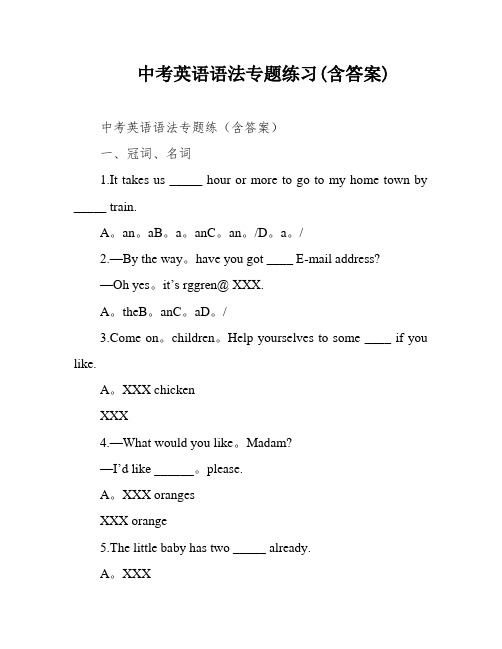
中考英语语法专题练习(含答案)中考英语语法专题练(含答案)一、冠词、名词1.It takes us _____ hour or more to go to my home town by _____ train.A。
an。
aB。
a。
anC。
an。
/D。
a。
/2.—By the way。
have you got ____ E-mail address?—Oh yes。
it’s rggren@ XXX.A。
theB。
anC。
aD。
/e on。
children。
Help yourselves to some ____ if you like.A。
XXX chickenXXX4.—What would you like。
Madam?—I’d like ______。
please.A。
XXX orangesXXX orange5.The little baby has two _____ already.A。
XXX6.There are many _____ in the school.A。
XXX7.The singer usually sings while playing _____ guitar.XXX8.It would be _____ waste of money to buy such a small dictionary.XXX9._____ good news we’re got!A。
What aB。
How aC。
WhatD。
How10.Because of the unhealthy diet。
many people in Africa die at _____ early age from XXX.A。
theB。
/C。
aD。
an11.—How soon shall we start the bicycle trip?—_______.A。
In five day’s timeB。
In five days’ timeC。
英语语法专题
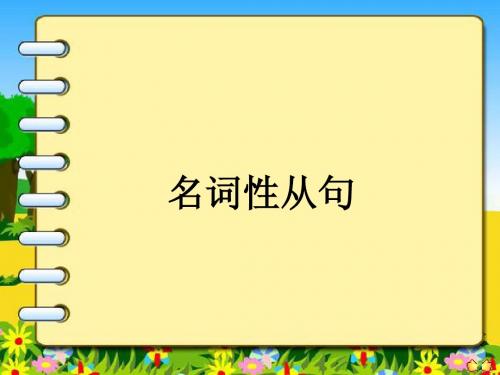
注意:有时同位语从句可以不紧跟在说明的名词后 面,而被别的词隔开,在语法上叫做分隔式同位语 从句。
The thought came to her that maybe she had left the door open when she left home. 她突然想起可能在她离开家时没把门关上。
1. 同位语从句
同位语从句常放在名词后面,说明该名词的具体内 容,这里名词称为同位语从句的先行词。同位语从 句的先行词多为: fact, news, idea, thought, question, reply, report, order, remark,hope, evidence, conclusion, rumor, decision, promise, theory, belief, information, principle, truth,possibility, doubt, words等
The point is whether we should lend him the money. 关键是我们应不应该借钱给他。 It is because I have ever heard of the story. 因为我听过那个故事。 The reason I didn’t go to school that day was ____ ill. A. due to B. that I fell C. because of falling D. because I fell 答案为B。译文:我那天没上学是因为我病了。
(2)whether和wh-疑问词引导的同位语从句 这些词在同位语从句中作一定的句子成分,不能省略。
I have no idea whether he’ll come or not. 我不知道他会不会来。 The problem why are you going to give up the plan has not been answered yet. 你为什么要放弃这个计划,对这个问题你还没有回答。
大学英语语法专题常考练习题
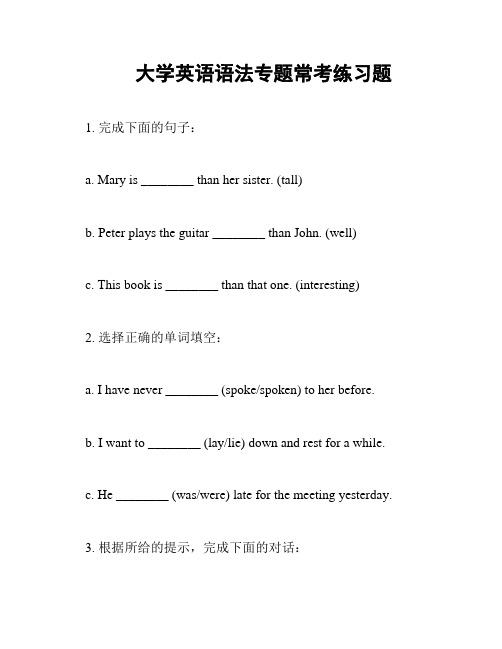
大学英语语法专题常考练习题1. 完成下面的句子:a. Mary is ________ than her sister. (tall)b. Peter plays the guitar ________ than John. (well)c. This book is ________ than that one. (interesting)2. 选择正确的单词填空:a. I have never ________ (spoke/spoken) to her before.b. I want to ________ (lay/lie) down and rest for a while.c. He ________ (was/were) late for the meeting yesterday.3. 根据所给的提示,完成下面的对话:A: Where did you go for your vacation?B: I went to ________ (France).A: How was the weather there?B: It ________ (rained/rain) a lot, but I still had a great time.A: Did you visit any famous landmarks?B: Yes, I went to the ________ (Eiffel Tower). It was amazing!4. 将下列句子变为被动语态:a. The teacher explained the lesson to the students.b. They have already visited the museum.c. Someone is cleaning the room.5. 选择正确的连接词填空:a. I want to go out for a walk ________ (but/when) it's not raining.b. He can speak French, ________ (so/but) he can't speak Spanish.c. She enjoys playing the piano, ________ (and/or) she loves singing.6. 根据所给的图片,选择适合的单词填空:a. The man is ________ (reading/drinking) a book.b. The girl is ________ (drawing/running) on a piece of paper.c. The boy is ________ (singing/sleeping) in bed.7. 选择正确的连词填空:a. I was tired ________ (but/although) I had enough sleep.b. She went to the store ________ (because/so) she needed to buy some groceries.以上是一些大学英语语法专题常考练习题,希望对你的学习有所帮助!。
高考英语真题语法专题及答案

高考英语真题语法专题及答案一、名词1. 下列句子中,名词的数与动词不一致的是( 2016 年全国高考)A. One of the factors that influence our life is our education.B. She gave up the advantages in the city and returned to her hometown.C. A large amount of money was offered to the charity organization.D. There isn't enough fresh water in the remote areas.正确答案:C2. 下列句子中,名词语义和数与冠词不搭配的一项是( 2019年全国高考)A. Both of them are doctors in the same hospital.C. Two pieces of paper were left on the desk.D. An oil spill caused serious damage to the coastal environment.正确答案:A二、动词时态3. Please let me know if you __________ any further information. (2017 年北京高考)A. needB. will needC. neededD. have needed正确答案:A4. I will have to go and work in the lab whether I ____ or not. (2018 年北京高考)A. wantB. am wantingC. will wantD. wanted正确答案:D三、形容词和副词5. The harder you work, ________ the progress you will make. (2015 年全国高考)A. much greatB. much greaterC. more much greatD. the more greater正确答案:B6. Peter was ________ to find his car missing. (2019 年全国高考)A. shockedB. surprisingC. surprising surprisedD. surprised正确答案:D四、代词7. ________ who has done his best will succeed in the end. (2016 年天津高考)A. WhoeverB. ThoseC. AnyoneD. Some正确答案:A8. John is leaving for Australia next week. Please give ________ my best wishes. (2018 年天津高考)A. herB. himC. meD. them正确答案:B五、连词9. ________ he never finished elementary school, he has a good knowledge of science. (2017 年全国高考)A. AlthoughB. BecauseC. UnlessD. Once正确答案:AA. sinceB. thereforeC. thoughD. because正确答案:D以上是高考英语真题语法专题及答案的部分内容,希望对你有帮助!。
英语语法专题训练

英语语法专题训练一、动词时态1. 现在时的用法现在时表示目前正在进行的动作或经常发生的动作。
它有以下几种基本用法:- 表示经常性动作:I drink coffee every morning.- 表示普遍真理:The sun rises in the east.- 表示固定安排:The train leaves at 9 o'clock.- 表示现阶段的情况:He is currently studying at university.2. 过去时的用法过去时表示过去发生的动作或状态。
它有以下几种基本用法:- 表示过去的某个时间点的动作:He arrived home at 6 o'clock last night.- 表示过去经常发生的动作:I used to play football with my friends every Sunday.- 表示过去某个持续的动作:She was reading a book when I entered the room.3. 将来时的用法将来时表示将来发生的动作或计划。
它有以下几种基本用法:- 表示将来的某个时间点的动作:They will travel to London next week.- 表示将来计划或意图:I am going to study abroad next year.- 表示将来的某个持续的动作:She will be cooking dinner while I clean the house.二、名词的种类1. 可数名词可数名词是指可以用单数和复数形式出现的名词。
它有以下几种基本用法:- 单数形式表示一个具体的事物:I bought a book yesterday.- 复数形式表示多个相同的事物:They have two cats.2. 不可数名词不可数名词是指不能用复数形式出现的名词。
它有以下几种基本用法:- 表示抽象的概念或物质:I love music.- 表示大量或不可分割的物质:She needs some milk for her coffee.三、形容词的用法1. 形容词作前置定语形容词可以用来修饰名词,并放在名词的前面。
英语语法专题-名词

The number of compound nouns
Compound nouns are formed by combining two or more words to create a new noun. These nouns are not hyphenated and are considered a single unit.
Common nouns can be further classified into specific types, such as countable nouns (e.g., "dog," "cat") and uncountable nouns (e.g., "milk," "bread").
04
They cannot be prepositions.
03
They cannot be adverbs.
neutral
01
Nouns are the grammatical category that names persons, places, things, ideas or abstract concepts.
03
The case of a noun
Nominative case
Nominative case
This is the case used when the noun is the subject of the sentence. It is also used when the noun is the direct object of certain verbs and in exclamations.
英语语法专题复习练习题目
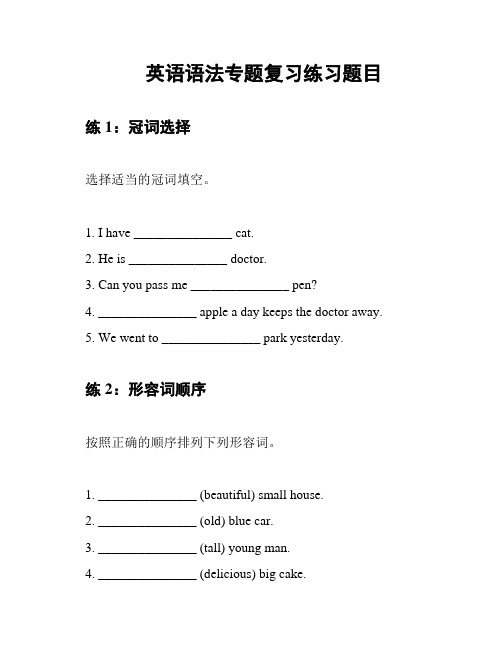
英语语法专题复习练习题目练1:冠词选择选择适当的冠词填空。
1. I have _______________ cat.2. He is _______________ doctor.3. Can you pass me _______________ pen?4. _______________ apple a day keeps the doctor away.5. We went to _______________ park yesterday.练2:形容词顺序按照正确的顺序排列下列形容词。
1. _______________ (beautiful) small house.2. _______________ (old) blue car.3. _______________ (tall) young man.4. _______________ (delicious) big cake.5. _______________ (interesting) science fiction movie.练3:动词时态根据句子意思,用适当的动词时态填空。
1. I _______________ (visit) my friend tomorrow.2. She _______________ (study) English every day.3. They _______________ (play) soccer last weekend.4. We _______________ (watch) a movie tonight.5. He _______________ (read) a book right now.练4:的/地/得的用法根据需要,在下列句子中填入适当的"的"、"地"或"得"。
1. 我走路走得很快。
2. 她是一个聪明的女孩。
高中英语所有语法专题大汇总
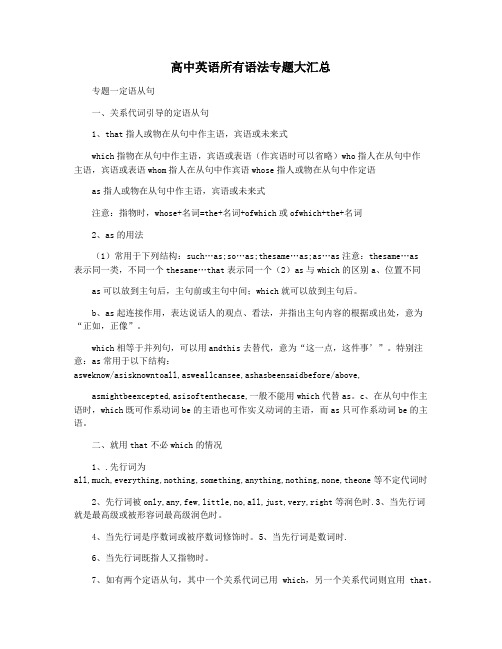
高中英语所有语法专题大汇总专题一定语从句一、关系代词引导的定语从句1、that指人或物在从句中作主语,宾语或未来式which指物在从句中作主语,宾语或表语(作宾语时可以省略)who指人在从句中作主语,宾语或表语whom指人在从句中作宾语whose指人或物在从句中作定语as指人或物在从句中作主语,宾语或未来式注意:指物时,whose+名词=the+名词+ofwhich或ofwhich+the+名词2、as的用法(1)常用于下列结构:such…as;so…as;thesame…as;as…as注意:thesame…as表示同一类,不同一个thesame…that表示同一个(2)as与which的区别a、位置不同as可以放到主句后,主句前或主句中间;which就可以放到主句后。
b、as起连接作用,表达说话人的观点、看法,并指出主句内容的根据或出处,意为“正如,正像”。
which相等于并列句,可以用andthis去替代,意为“这一点,这件事’”。
特别注意:as常用于以下结构:asweknow/asisknowntoall,asweallcansee,ashasbeensaidbefore/above,asmightbeexcepted,asisoftenthecase,一般不能用which代替as。
c、在从句中作主语时,which既可作系动词be的主语也可作实义动词的主语,而as只可作系动词be的主语。
二、就用that不必which的情况1、.先行词为all,much,everything,nothing,something,anything,nothing,none,theone等不定代词时2、先行词被only,any,few,little,no,all,just,very,right等润色时.3、当先行词就是最高级或被形容词最高级润色时。
4、当先行词是序数词或被序数词修饰时。
5、当先行词是数词时.6、当先行词既指人又指物时。
- 1、下载文档前请自行甄别文档内容的完整性,平台不提供额外的编辑、内容补充、找答案等附加服务。
- 2、"仅部分预览"的文档,不可在线预览部分如存在完整性等问题,可反馈申请退款(可完整预览的文档不适用该条件!)。
- 3、如文档侵犯您的权益,请联系客服反馈,我们会尽快为您处理(人工客服工作时间:9:00-18:30)。
专题一 │ 正面解读
(1) [2010· 四川卷] In __ most countries,a university degree can give you __ flying start in life. A.the;a B.the;/ C./;/ D./;a 【解析】 D 考查冠词词义辨析。第一空是泛指大多数 国家,省略冠词;第二空也是泛指,start在这里作可数 名词,意为“起始优势;良好的基础条件”。a start in life为习惯搭配,意为“有利于人生成功的优势”。句意 :在大多数国家,一张大学文凭能为你快速发展奠定良 好的基础。
专题一 │ 正面解读
正面解读
一、冠词的基本用法与习惯用法 关于冠词的基本用法和习惯用法,我们要记住这个 口诀: 名词冠词不分家,泛指特指惯用法。 名词冠词不分家:冠词是虚词,不能单独使用,必 须依附于名词才有存在的意义。而名词的可数与不可数 ,单数与复数等特点反过来也会影响冠词的使用。
专题一 │ 正面解读
泛指特指惯用法:泛指即不明确具体所指,是不定冠 词a (an)和零冠词(即不使用冠词)的基本用法。而特指是指 说话者和听话者都明确无误地知道所指,是定冠词 the 的 基本用法。我们把那些没有规律的习惯搭配称为惯用法, 它们需要单独记忆。
专题一 │ 正面解读
1.冠词的基本用法 名词 单数可数名词 复数可数名词 不可数名词
语法专题
专题一 正反解读冠词 专题二 正反解读名词 专题三 正反解读代词 专题四 正反解读形容词、副词 专题五 正反解读介词 专题六 正反解读动词和动词短语 专题七 正反解读非谓语动词 专题八 正反解读情态动词和虚拟语气 专题九 正反解读动词的时态、语态 专题十 正反解读定语从句 专题十一 正反解读名词性从句 专题十二 正反解读状语从句 专题十三 正反解读特殊句式 专题十四 正反解读主谓一致与数词
专题一 │ 正面解读
(3) Some people fear that __ air pollution may bring about changes in __ weather around the world. A./;the B.the;/ C.an;the D.the;a 【解析】 A air pollution 是抽象名词,这里是泛指,不 用冠词;weather在这里特指全球的气候,因此用the。 2. 冠词的习惯用法 很多情况下,是否要加冠词,常常是一个习惯用法问题 ,特别是在一些固定的词组中,有时是说不出道理的。 如:
(1) [2010· 辽宁卷] There are over 58000 rocky objects in __ space,about 900 of which could fall down onto __ earth. A.the;the B./;the C.the;/ D.a;the 【解析】 B 考查冠词。第一空in space 是固定短语, 不用冠词;第二空名词 earth属于独一无二事物的名词, 其前必须用定冠词。句意为:太空中有超过58000个岩状 物体,其中大约900个有可能掉到地球上。
journey.
long journey.
money I had
saved.
专题一 │ 正面解读
注意:the与可数名词单数搭配有时可泛指,表类属。如 :The horse is a useful animal. 在我们说话时,先明确我们要泛指还是特指我们所 要谈的人或物,然后相应的选择合适的冠词。其他的基 本都可归为惯用法,需要理解后记忆即可。如果掌握了 这一规律,把复杂的问题简单化后,你会发现很多问题 都可以迎刃而解。如:用在序数词,形容词最高级及形 容词only, very, same等前面的the其实就是the的基本用法 , 即 特 指 。 请 体会: That's the very thing I've been looking for. 那正是我要找的东西。如:
专题一 │ 正面解读
(2) —I knocked over my coffee cup. It went right over keyboard. —You shouldn't put drinks near __ computer. A.the;/ B.the;a C.a;/ D.a;a 【解析】 B 考查冠词特指和泛指的用法。keyboard是 对话双方都已知的事物,所以其前用the;而computer表 示泛y people are still in __ habit of writing silly things in __ public places. A.the;the B./;/ C.the;/ D./;the 【 解析 】 C 第一空是固定搭配中冠词的使用: in the habit of;第二空考查冠词的基本用法,“在公共场所” 是泛指,故不使用冠词。 二、抽象名词和物质名词具体化 1. 不可数名词的具体化,包括抽象名词的具体化和物质名 词的具体化。所谓抽象名词的具体化,是指冠词用在抽 象名词之前,表示“一种”、“一类”或“一个具体情 况”等概念,使本来抽象的名词具体化,具有了“一” 的含义。
专题一 │ 正面解读
in town have a cold 感冒了 在城里 in the city catch (a) cold at a distance 在一定距离外 in the distance 在远处 in danger of…有……的危险 in the habit of…有……的习惯
专题一 │ 正面解读
语法专题
专题一 正反解读冠词
专题一 │ 考点荟萃 考点荟萃
冠词不仅是高考单项填空题中常考的项目,而且在 书面表达题中,学生更容易发生语感性和过失性错误, 影响了文章的整体水平。冠词虽然只有三个 a, an和 the ,但所使用的场合却纷繁复杂,学生记忆起来常常没有 头绪。下面来了解冠词的复习要点。
冠词
泛 指 (a/an/ 零 A horse is a useful 冠词) animal. Horses are useful animals. Money is not everything.
特指(the)
The horse was tired after a long
The horses were I bought him a tired after a present with the
